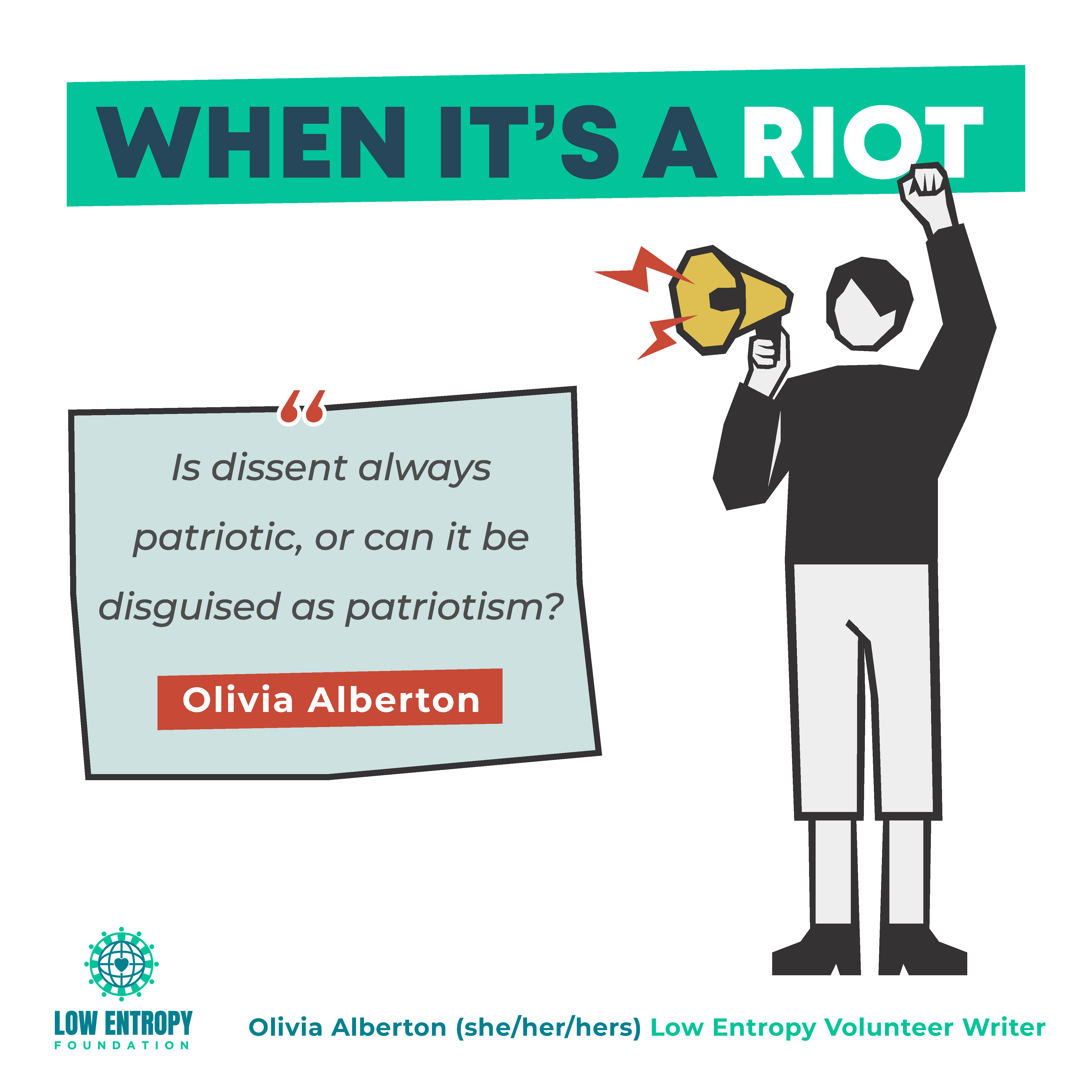When It’s a Riot
July 22, 2023

Olivia Alberton (she/her/hers), Low Entropy Volunteer Writer
Two large themes present in history are dissent and patriotism. Dissent based on patriotism has created tremendous change and has shaped the world we live in today. Some examples include the American Revolution, the suffrage movement and the civil rights movement. Modern examples of dissent grounded in patriotism can include things like the storming of Capitol Hill on January 6, 2021 (which some say was patriotic) and the Canadian convoy protest from January to February 2022. With these examples emerges a complex statement that deserves attention: Dissent is patriotic. Is this statement true? Is dissent always patriotic, or can it be disguised as patriotism? This complex statement evokes a somewhat complex discussion.
To unpack these questions, it is important to define each term. Dissent can be defined as “an unwillingness to cooperate with an established source of authority, which can be social, cultural, or governmental” (Redhead). Each example listed in the introduction involved going against either government laws/mandates or social and cultural norms that were seen as either prejudicial, sexist or racist. Patriotism is characterized as a “feeling of attachment and commitment to a country, nation, or political community” (Baumeister). Singing the national anthem or having the country’s flag hanging on your lawn are some examples of patriotism. However, sometimes the line between patriotism and dissent can be blurred. Let us take two examples from the introduction and compare them.
The first example that can be discussed is the civil rights movement in America during the 1960s. African Americans were treated as “others,” facing racist laws, discrimination, and segregation. This movement was about fighting against this white hegemonic structure in America to create space for African Americans to not just survive, but to live. Dr. Martin Luther King urged nonviolent protests, seeing it not as a sign of cowardice, but rather a form of resistance. Some of the peaceful protests included the Jackson Woolworth’s sit-in and the Freedom Rides. The Freedom Rides were organized by the Congress of Racial Equality (“CORE”), an African American civil rights organization; the rides were orchestrated to protest the Southern States ignoring the Supreme Court ruling in Browder v. Gayle, which stated that segregated seating on buses was illegal. Black and white volunteers would go on a bus and drive to various areas in the Southern States from Washington as a statement that they deserved freedom not just in their state, but in their country. Therefore, the Freedom Rides showed how people were banding together to go against an established source of authority in a peaceful, powerful, non-violent way.
Another example is the storming of capitol hill on January 6, 2021. The storming was in response to the 2021 election results. Many Trump supporters believed that the election was rigged and, as such, decided to gather and protest, one of these groups being the “Proud Boys.” American flags were waving in the air and “Make America Great Again” signs were seen in waves. Delivering a speech, Trump stated, “I know that everyone here will soon be marching to the Capitol building to peacefully and patriotically make your voices heard” (BBC). The word patriotically is key in his speech. Trump emphasized that the people who protested were “great patriots” (BBC). However, there was nothing peaceful about this protest: it was more like a riot, unlike the protests in the civil rights movement. Glass was broken, people in the building were hiding in fear for their lives, people were harmed and some even died. Some said that what these individuals did was patriotic, as they were standing up for their country. However, can this act of dissent be seen as patriotic, given everything that transpired? Are these American ideals and values? Some would say yes, and others would say no.
Thus, when the statement, “dissent is patriotic” arises, there is no clear-cut answer. I think a large part of the problem is that everyone has their own ideas about what dissent and patriotism mean. If someone is dissenting, shouldn’t it be peaceful? If someone uses violence, does that make the act a riot? Is activism always equated with dissent? In Greek and Roman antiquity, political patriotism was conceived as loyalty to the patria and connected to a political conception of the republic (Baumeister). The conception of the republic is interesting, because I’m sure that we all have a different concept of Canada’s values and ideals. Therefore, I think that dissent can be patriotic. However, dissent can also be disguised as patriotism; it all depends on an individual’s beliefs and on how it is carried out.
Citations
Baumeister, Andrea. “Patriotism.” Encyclopedia Britannica, https://www.britannica.com/topic/patriotism-sociology.
“Capital Riots Timeline: What Happened on 6 January 2021?” BBC.News, 9 June 2022, https://www.bbc.com/news/world-us-canada-56004916.
Redhead, Mark. “Dissent.” Encyclopedia Britannica, 5 May 2023, https://www.britannica.com/topic/dissent-political#:~:text=dissent%2C%20an%20unwillingness%20to%20cooperate,social%2C%20cultural%2C%20or%20governmental.
—
Olivia is a recent McMaster University graduate with a combined honours in English & cultural studies and history. She loves to read, write and, of course, drink coffee.
GET INVOLVED
At Low Entropy, we believe changing the world starts with changing ourselves.
Founded in 2015, Low Entropy Facilitates conversations that encourage diversity and promote inclusivity.
We understand that life can be confusing at times. It can seem challenging and sometimes you may feel like no one really “gets you.” We offer an opportunity to connect with others who have the capacity to understand you.









